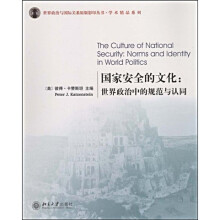国家安全的文化:世界政治中的规范与认同

Preface
1. Introduction: Alternative Perspectives on National Security
Peter J. Katzenstein
Why Traditional National Security Issues?
Existing Analytical Perspectives
Cultural-Institutional Context and Political Identity
Why Bother?
2. Norms, Identity, and Culture in National Security
Ronald L. Jepperson, Alexander Wendt, and Peter J. Katzenstein
Analytical Context
Theoretical Perspectives
Arguments
Methodological and Metatheoretic Matters
Extension and Conclusion
PART 1. Norms and National Security
3. Status, Norms, and the Proliferation of Conventional Weapons:
An Institutional Theory Approach
Dana P. Eyre and Mark C. Suchman
Standard Explanations for the Proliferation of Weaponry
An Alternative Perspective: Obligatory Action and an
Institutional Theory of Weapons Proliferation
Hypotheses
Research Design, Data, and Methods of Analysis
Results
4. Norms and Deterrence: The Nuclear and Chemical Weapons Taboos
Richard Price and Nina Tannenwald
The Social Construction of Deterrence
The Chemical Weapons Taboo
The Non-use of Nuclear Weapons
Norms, Constructivism, and Explanation
5. Constructing Norms of Humanitarian Intervention
Martha Finnemore
Using Norms to Understand International Politics
Humanitarian Intervention in the Nineteenth Century
The Expansion of "Humanity" and Sovereignty
Humanitarian Intervention Since 1945
6. Culture and French Military Doctrine Before World WarII
Hizabeth Kier
Alternative Explanations
The Cultural Roots of Doctrinal Decisions
The Cultural Roots of French Doctrine
7. Cultural Realism and Strategy in Maoist China
Alastair lain Johnston
Why China?
Some Conceptual and Methodological Issues
The Maoist Central Paradigm
Strategic Preference Rankings
Chinese Conflict Behavior
Problems of Analysis
PART 2. Identity and National Security
8. Identity, Norms, and National Security: The Soviet Foreign Policy
Revolution and the End of the Cold War
Robert G. Herman
Realist and Liberal Explanations
I he Empirical Case
BacktOthe Future?
9.Norms,Identity,and National Security in Germany and Japan
Thomas U.Berger
Deficiencies ofStructurai Accounts
The Concept ofPolitical.Military Culture
The Origins ofthe New Political—Military Cultures
The Evolution ofthe Two Political—Military Cultures
The Evolution ofGerman and Japanese Security Policies
10.CoUective Identity in a Democratic Community:
TheCase ofNATO
Thomas Risse—Kappen
The Puzzle
Theorizing About Alliances
A Liberal Interpretation ofthe Transatlantic Security Community
Conclusions:HOW Unique Is NATO?
11.Identity and AIliances i11 the Middle East
Michael N.Barnett
Identity and AIliance Formation
Identity and Alliances in Arab Politics
U S—Israeli Relations
PART 3.ImplicationsandConclusions
12.Norms,Identity,and Their Limits:A Theoretical Reprise
Paul Kowert and Jeffrey Legro
HOW Norms Matter
The Sources ofNorms
Challenges in the Study ofNorms
13.Conclusion:National Security in a Changing W0rld
Peter T.Katzenstein
Realism and LiberaIism
Summary and Extensions
Going Beyond Traditional National Security Studies
America in a Changing World
Index
1. Introduction: Alternative Perspectives on National Security
Peter J. Katzenstein
Why Traditional National Security Issues?
Existing Analytical Perspectives
Cultural-Institutional Context and Political Identity
Why Bother?
2. Norms, Identity, and Culture in National Security
Ronald L. Jepperson, Alexander Wendt, and Peter J. Katzenstein
Analytical Context
Theoretical Perspectives
Arguments
Methodological and Metatheoretic Matters
Extension and Conclusion
PART 1. Norms and National Security
3. Status, Norms, and the Proliferation of Conventional Weapons:
An Institutional Theory Approach
Dana P. Eyre and Mark C. Suchman
Standard Explanations for the Proliferation of Weaponry
An Alternative Perspective: Obligatory Action and an
Institutional Theory of Weapons Proliferation
Hypotheses
Research Design, Data, and Methods of Analysis
Results
4. Norms and Deterrence: The Nuclear and Chemical Weapons Taboos
Richard Price and Nina Tannenwald
The Social Construction of Deterrence
The Chemical Weapons Taboo
The Non-use of Nuclear Weapons
Norms, Constructivism, and Explanation
5. Constructing Norms of Humanitarian Intervention
Martha Finnemore
Using Norms to Understand International Politics
Humanitarian Intervention in the Nineteenth Century
The Expansion of "Humanity" and Sovereignty
Humanitarian Intervention Since 1945
6. Culture and French Military Doctrine Before World WarII
Hizabeth Kier
Alternative Explanations
The Cultural Roots of Doctrinal Decisions
The Cultural Roots of French Doctrine
7. Cultural Realism and Strategy in Maoist China
Alastair lain Johnston
Why China?
Some Conceptual and Methodological Issues
The Maoist Central Paradigm
Strategic Preference Rankings
Chinese Conflict Behavior
Problems of Analysis
PART 2. Identity and National Security
8. Identity, Norms, and National Security: The Soviet Foreign Policy
Revolution and the End of the Cold War
Robert G. Herman
Realist and Liberal Explanations
I he Empirical Case
BacktOthe Future?
9.Norms,Identity,and National Security in Germany and Japan
Thomas U.Berger
Deficiencies ofStructurai Accounts
The Concept ofPolitical.Military Culture
The Origins ofthe New Political—Military Cultures
The Evolution ofthe Two Political—Military Cultures
The Evolution ofGerman and Japanese Security Policies
10.CoUective Identity in a Democratic Community:
TheCase ofNATO
Thomas Risse—Kappen
The Puzzle
Theorizing About Alliances
A Liberal Interpretation ofthe Transatlantic Security Community
Conclusions:HOW Unique Is NATO?
11.Identity and AIliances i11 the Middle East
Michael N.Barnett
Identity and AIliance Formation
Identity and Alliances in Arab Politics
U S—Israeli Relations
PART 3.ImplicationsandConclusions
12.Norms,Identity,and Their Limits:A Theoretical Reprise
Paul Kowert and Jeffrey Legro
HOW Norms Matter
The Sources ofNorms
Challenges in the Study ofNorms
13.Conclusion:National Security in a Changing W0rld
Peter T.Katzenstein
Realism and LiberaIism
Summary and Extensions
Going Beyond Traditional National Security Studies
America in a Changing World
Index
彼得·卡赞斯坦(Peter J.Katzenstein),美国哈佛大学博士(1973年),现任康奈尔大学Walter S.Carpente,Jr国际关系学教授。曾任著名的《国际组织》杂志主编,为国际关系学建构主义流派的重要代表人物之一,与现实主义流派的重要代表斯蒂芬·克拉斯纳和新自由主义流派的重要代表罗伯特·基欧汉并称为“三K”。他著述甚丰,其中包括《文化规范与国家安全:战后日本的警察与军队》、《世界市场中的小国:欧洲的工业政策》、《社团主义与变革:奥地利、瑞士和工业政治》、《网络权力:日本与亚洲》、《被驯服的大国:德国在欧洲》等。
《国家安全的文化:世界政治中的规范与认同》为国际关系学经典名著,建构主义国际关系流派代表作之一。在《国家安全的文化:世界政治中的规范与认同》中,16位重要学者将社会学与安全研究进行了创新性的融合,从规范、认同的角度出发集中分析了世界政治中的安全议题,对现实主义和自由主义的学术观点进行了评析和发展,成为后来建构主义国际关系学的“里程碑”。
比价列表
公众号、微信群
 缺书网
缺书网微信公众号
 扫码进群
扫码进群实时获取购书优惠





